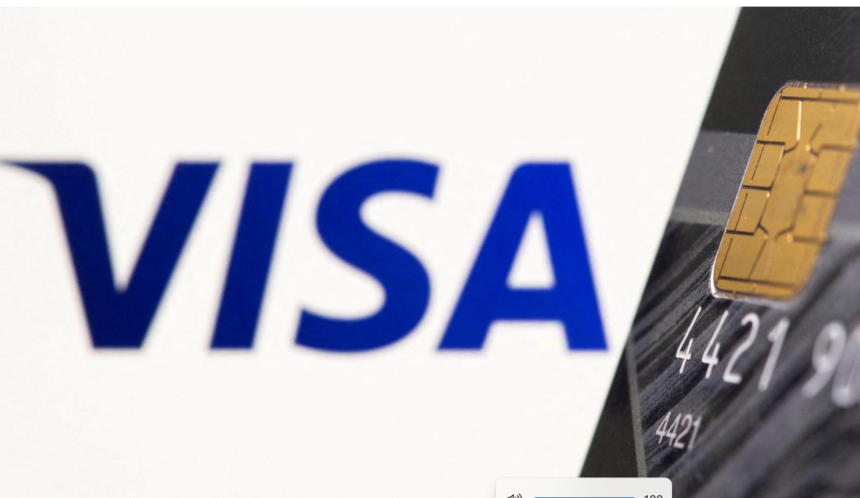In a landmark move, the U.S. Department of Justice (DOJ) has filed an antitrust lawsuit against Visa Inc., one of the world’s largest payment processors, accusing the financial giant of monopolizing the debit card market. This lawsuit, which is part of a broader crackdown on monopolistic practices in the tech and financial sectors, alleges that Visa has been using its dominant market position to stifle competition, restrict innovation, and harm consumers by maintaining high fees for merchants and limiting choices for debit card transactions.
The DOJ’s lawsuit marks a significant escalation in the U.S. government’s efforts to curtail the power of large corporations, especially those that wield significant influence over critical areas of the economy. In this case, the debit card market is at the center of the controversy, as it forms a crucial component of the modern financial system, facilitating billions of transactions each year. Visa, with its enormous market share and reach, plays a key role in this market, but according to the DOJ, it has been abusing that role to entrench its monopoly power.
This article explores the DOJ’s antitrust lawsuit against Visa, examining the specifics of the case, the history of Visa’s dominance in the debit card market, the implications for consumers and competitors, and the broader significance of this lawsuit in the context of U.S. antitrust law and financial regulation.
Visa’s Dominance in the Debit Card Market
Visa Inc. is a multinational financial services company that facilitates electronic payments across the globe. It operates one of the largest card networks, processing trillions of dollars in transactions each year. Visa’s debit cards are ubiquitous in the United States, with millions of consumers relying on them for everyday purchases. Along with its main rival, Mastercard, Visa dominates the global card payment industry.
According to industry reports, Visa holds a significant majority share in the U.S. debit card market, processing over 60% of all debit card transactions. The company’s vast network of card issuers, merchants, and consumers provides it with an unparalleled reach in the payments ecosystem. However, the DOJ alleges that Visa has been using its market dominance to engage in anti-competitive practices, particularly in the debit card sector.
The DOJ’s lawsuit focuses on Visa’s control over two key aspects of the debit card market:
- Network Fees: Visa charges fees to merchants every time a consumer uses a Visa debit card to make a purchase. These fees, known as “interchange fees,” are set by Visa and paid by merchants to card-issuing banks. The DOJ alleges that Visa’s interchange fees are artificially high, harming merchants by increasing the cost of accepting debit cards as a form of payment.
- Routing Restrictions: Under the Durbin Amendment, part of the Dodd-Frank Wall Street Reform and Consumer Protection Act, merchants have the right to choose between different payment networks when processing debit card transactions. This amendment was designed to foster competition by allowing merchants to select networks that charge lower fees. However, the DOJ claims that Visa has been restricting merchants’ ability to route transactions through lower-cost networks, thereby maintaining its monopoly and keeping fees high.
Allegations of Anti-Competitive Practices
The DOJ’s antitrust lawsuit against Visa centers around several key allegations:
1. Exclusionary Contracts
The DOJ alleges that Visa has engaged in exclusionary contracting practices that prevent competitors from gaining a foothold in the debit card market. Specifically, Visa is accused of entering into agreements with banks, merchants, and other payment processors that effectively lock out rival payment networks. These exclusionary contracts ensure that Visa remains the dominant player in the market, preventing other networks from offering their services to merchants and consumers.
By limiting the ability of competing networks to process debit card transactions, Visa allegedly maintains its control over interchange fees, allowing it to keep prices high and reduce competitive pressure. This practice, according to the DOJ, stifles innovation in the payment processing industry, as competitors are unable to challenge Visa’s dominance or offer alternative, more efficient solutions.
2. Routing Restrictions
One of the core allegations in the Department of Justice lawsuit is that Visa has imposed routing restrictions that prevent merchants from choosing alternative, lower-cost payment networks. Under the Durbin Amendment, merchants are supposed to have the option of routing debit card transactions through at least two unaffiliated networks, including Visa and its competitors. This was intended to promote competition and reduce the costs of debit card transactions for merchants.
However, the Department of Justice contends that Visa has implemented rules and practices that effectively block merchants from routing transactions through alternative networks, even when those networks offer lower fees. By limiting the choices available to merchants, Visa is accused of maintaining its market dominance and artificially inflating the cost of debit card transactions.
These routing restrictions are particularly problematic for small and medium-sized businesses, which often operate on tight margins and are more sensitive to the fees charged by payment processors. The Department of Justice argues that Visa’s practices disproportionately harm these businesses, as they are forced to pay higher fees to process debit card transactions, ultimately passing those costs onto consumers in the form of higher prices.
3. Suppression of Innovation
Another key element of the Department of Justice lawsuit is the claim that Visa’s anti-competitive practices have suppressed innovation in the payment processing industry. By preventing competitors from gaining a foothold in the market, Visa allegedly stifles the development of new technologies and payment solutions that could benefit consumers and merchants alike.
For example, emerging payment networks that offer faster, more secure, or lower-cost transaction processing have struggled to gain traction in the market due to Visa’s dominance. This lack of competition, according to the Department of Justice, reduces the incentive for Visa to innovate and improve its own services, resulting in a stagnation of technological advancement in the debit card market.
Implications for Consumers and Competitors
The Department of Justice lawsuit against Visa has far-reaching implications for both consumers and competitors in the debit card market. If the Department of Justice allegations are proven true, it could lead to significant changes in the way debit card transactions are processed, the fees charged to merchants, and the availability of alternative payment networks.
1. Lower Fees for Merchants
One of the primary goals of the Department of Justice antitrust lawsuit is to promote competition in the debit card market, which could lead to lower fees for merchants. If Visa is found to have engaged in anti-competitive practices, it could be forced to change its contracting and routing practices, allowing merchants to choose lower-cost networks for processing transactions. This, in turn, would reduce the fees merchants pay to process debit card transactions, potentially saving them billions of dollars each year.
Lower fees for merchants could also benefit consumers, as businesses may pass on these savings in the form of lower prices. In a highly competitive retail environment, even small reductions in transaction fees can make a significant difference, particularly for small businesses that operate on thin profit margins.
2. Increased Competition and Innovation
If the Department of Justice lawsuit is successful, it could open the door for increased competition in the debit card market. By eliminating Visa’s exclusionary contracts and routing restrictions, competing payment networks would have a better chance of gaining market share and offering innovative solutions to merchants and consumers.
This increased competition could spur innovation in the payment processing industry, leading to the development of new technologies that improve the speed, security, and efficiency of debit card transactions. Consumers would benefit from a wider range of payment options and potentially lower fees, while merchants would have greater flexibility in choosing the payment networks that best suit their needs.
3. Potential for Regulatory Reforms
The Department of Justice lawsuit against Visa could also prompt broader regulatory reforms in the payment processing industry. The case has already drawn attention to the issue of interchange fees and the lack of competition in the debit card market, and a successful outcome for the Department of Justice could lead to new regulations aimed at promoting competition and protecting merchants from anti-competitive practices.
For example, regulators may revisit the Durbin Amendment and consider additional measures to ensure that merchants have genuine choice in routing debit card transactions. They could also introduce stricter oversight of the contracting practices used by dominant payment processors like Visa and Mastercard to prevent the use of exclusionary agreements that stifle competition.
Broader Significance of the Lawsuit
The Department of Justice lawsuit against Visa is part of a broader trend of increased scrutiny of large corporations, particularly in the tech and financial sectors. Over the past few years, there has been a growing concern that some of the world’s largest companies, including Visa, Mastercard, Amazon, Google, and Facebook, have amassed too much power and influence, stifling competition and harming consumers.
The Biden administration has made antitrust enforcement a priority, and the Department of Justice lawsuit against Visa is one of several high-profile cases aimed at curbing the power of dominant corporations. This lawsuit, along with other antitrust cases, signals a shift toward more aggressive enforcement of competition laws and a renewed focus on promoting fairness in the marketplace.
Conclusion
The U.S. Department of Justice’s antitrust lawsuit against Visa represents a critical moment in the ongoing battle against monopolistic practices in the financial services industry. By accusing Visa of monopolizing the debit card market through exclusionary contracts, routing restrictions, and anti-competitive practices, the Department of Justice is seeking to promote competition, lower fees, and foster innovation in the payment processing industry.
The outcome of this lawsuit could have far-reaching implications for consumers, merchants, and competitors in the debit card market, as well as for the broader regulatory landscape. If the Department of Justice is successful in its case, it could lead to significant changes in the way debit card transactions are processed and pave the way for increased competition and innovation in the financial services industry.
In a world where electronic payments are increasingly central to the functioning of the economy, ensuring that competition remains robust and fair is more important than ever. The Department of Justicelawsuit against Visa is a step in that direction, aiming to protect the interests of consumers and businesses alike by holding powerful corporations accountable for their actions. ALSO READ:- Japan Seeks Safety for Its Citizens in China After Fatal Stabbing of Japanese Boy 2024





